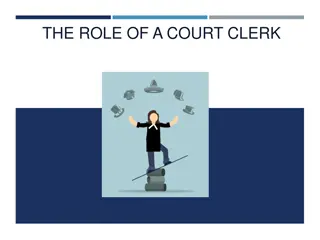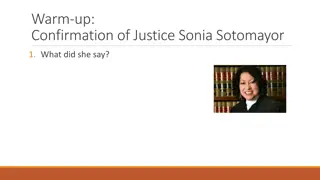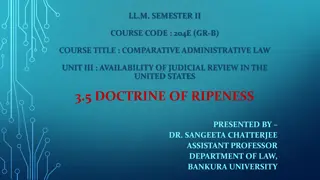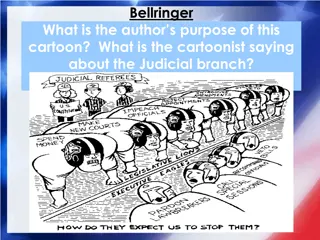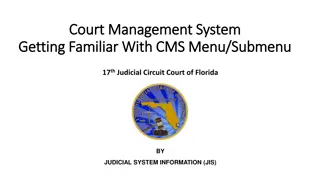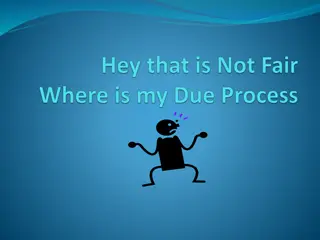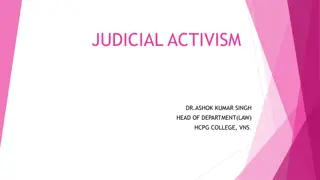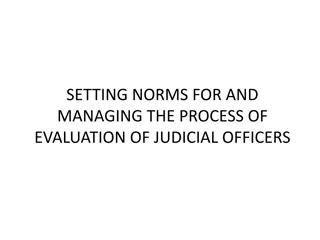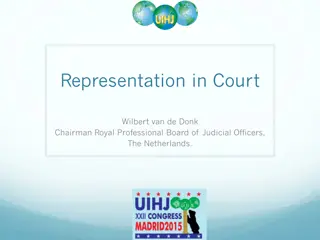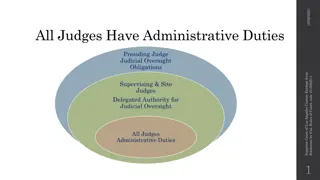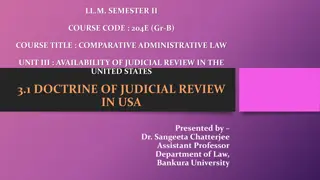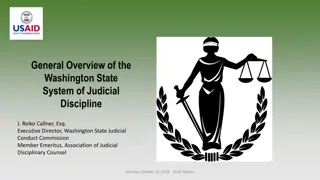Challenges Faced by Judicial Officers in Court and Case Management
Judicial officers encounter difficulties in court and case management, including expeditious disposal, control over cases, discouraging wasteful pre-trial activities, and fixing schedules for applications, replies, and disposal. The process involves initial case management conferences, timely completion of pleadings, fixing trial schedules, and ensuring trial completion within one year.
Download Presentation

Please find below an Image/Link to download the presentation.
The content on the website is provided AS IS for your information and personal use only. It may not be sold, licensed, or shared on other websites without obtaining consent from the author.If you encounter any issues during the download, it is possible that the publisher has removed the file from their server.
You are allowed to download the files provided on this website for personal or commercial use, subject to the condition that they are used lawfully. All files are the property of their respective owners.
The content on the website is provided AS IS for your information and personal use only. It may not be sold, licensed, or shared on other websites without obtaining consent from the author.
E N D
Presentation Transcript
On Difficulties faced by a Judicial Officer in Court and Case Management By MUHAMMAD ADIL, CIVIL JUDGE-X, MANSEHRA 1
Order IX-A CASE MANAGEMENT AND SCHEDULING CONFERENCE: The court shall under its own supervision after receiving plaint, petition, or appeal, start case management and scheduling conference which means and include : Expeditious disposal, Control of court over the case that it can not be protracted due to lack of management, Discouraging wasteful pre-trial activities etc Provided that if court does not call such conference it shall be bound to record reasons for not doing so, 7 days prior to conducting any case management and scheduling conference for hearing of application, discovery, settlement or trial the court shall serve parties proforma A,B,C and D respectively specified in Schedule V . 77 did7 day 2
Court after consultation with parties/counsel shall fix three dates: i. A date by which parties shall file any of the application. ii. Date by which parties shall file replies to such applications. iii. Date by which applications shall be disposed of (unless adjourned). Provided that proceedings under this clause shall be completed with the maximum period of 60 days, commencing from the date of attendance of the parties. After exhausting this opportunity, no opportunity shall be provided to any parties for making any application, if he opts not to file such application or reply thereto . Any order under this rule shall not be appealable or revisable. 3
After completion of pleadings (plaint and written statement) Court fix time schedule which shall not exceed 30 days for, a) Developing consultation with parties/counsel on factual and legal statement of controversy. b) Employing all or any mode of investigation under order X, XI and XII. Or. X: Examination of parties by Court, Or. XI: Discovery and inspection. Or. XII. Admission. c) Requiring parties to submit their proposed Exhibits along with proforma-E and conducting scrutiny under Order XIII, Or. XIII. Production, impounding and return of documents. 4
If case is not summarily decided (before or after framing of issues) and is fixed for trial, then court in consultation with parties/counsel within 7 days establishing a time schedule for, a) Presenting and exchanging list of witnesses on proforma F-I and F-II ( Fifth Schedule), b) Procuring the certificate of readiness from parties to produce their witnesses and documentary evidence in Court on proforma-G (Fifth Schedule). c) Proceedings with trial within which party shall be bound to present their evidence and cross examine each other s witnesses. All efforts shall be made by court to hold De Die in Diem (day to day) trial. Provided that court shall conduct trial within one year. 5
At any stage during proceedings of the case, the court with consent of parties may imply any of the mode of settlement of dispute for expeditious disposal of the case. 6
If parties or his counsel fail to appear, is unprepared, does not participate or fails to obey case management and scheduling order, the court in addition to any other penalty under this code shall order such party to pay reasonable expenses or impose fine(unless non compliance was justified). Retrospective Effect: The provision of this order shall mutatis mutandis (all necessary changes having been made) apply to all the pending cases before any court. 7
CASE MANAGEMENT Purpose: Inexpensive and expeditious Justice and ensuring fair disposal of civil cases 8
First Case Management Conference Second Case Management Conference Judicial Settlement Conference Trail Management Conference Case Management Conference for Appeal Attending a Case Management Conference Trail Management 9
Court Shall convene Plaintiff(s) or his Counsel to review case for, i. Valuation , ii. Jurisdiction, iii. Disclosure of Case of action( it is often confused with plaintiff(s) having cause of action which can only be decided at the later stage or on conclusion of the case), iv. Determination of nature of Summons, and v. Limitation. Agenda for conference shall be matter specified in Schedule A 10
Matters for consideration at the first case management Conference: Whether initial disclosure has been provided; Valuation of suit for court fee and Jurisdiction; Jurisdiction: Pecuniary, territorial, and Subject matter; Whether discovery or scrutiny of documents is required; Whether summon should be issued for settlement of issues or final disposal; Whether additional parties should be joined; and VII. Any other matter as agreed or required. I. II. III. IV. V. VI. 11
After pleadings are filed(means after submission of written statement(s)) Court shall within 7 days convene Case Management Conference for examination of parties to determine the admissibility of, Documents ii. Necessity or desirability of local inspection through commission i. Obtaining evidence through Affidavit ; and Spot Check either for Summary Judgment or settlement of issues. Agenda for this conference shall be the matters specified in Schedule B iii. iv. 12
Maters for consideration at the second case management conference The necessity or desirability of amendment in the pleadings; I. The necessity or desirability of joining other parties; II. The necessity or desirability of local inspection through commission; III. Obtaining evidence through affidavit; IV. Obtaining proposed exhibits and scrutinizing them within the mandate of Order XIII, CPC V. 13
The Court may convene a judicial settlement conference any time and refer the case to a person or body constituted or notified by the Government or a Mediation Center notified by the High Court. Mediation center shall be presided over by a settlement Judge. 14
The settlement Judge shall be bound to complete the settlement proceedings within the time set by the trial court. However, the trail court may if consider appropriate extend the time. The mediation process shall be confidential and not reported or recorded. The settlement Judge shall not transmit any information to the trail Judge except the report that, The partied are unable to reach settlement The parties have reached an agreement which may be reduced in writing: Meaningful mediation is ongoing; or The settlement Judge withdraws from the mediation process concluding that mediation efforts would not be useful. 15
After the parties are considered at issue the court shall convene a conference for trail management. Agenda for the conference shall be the matter specified in Schedule C 16
Readiness for Trail i. List of witnesses; ii. The order in which evidence is given before the court or the local commission; iii. Limiting the number, length, and format of witness statement before the court or the local commission; iv. The issues on which evidence is required including the nature of evidence to decide those issues; v. The documents of reliance; vi. The record to be summoned through revenue record cell; vii. The mode of evidence either orally, by affidavit, through local commission, video-link or spot-check; and viii.Scheduling any step or stage of the trial including written and oral arguments; ix. Cost, and x. Any other matter agreed by the parties. 17
Before admission of the appeal, or following the notice of appeal (as the case may be) the court shall convene a case management conference. Agenda for the conference shall be the matters specified in Schedule D 18
Matters for consideration at the conference Examination of memo of appeal Security in case of order for execution of decree appealed from fixing a timetable for deciding any application relating to the appeal or for appeal as a whole; Fixing a timetable for any evidence to be presented in appeal; Consolidating two or more appeals raising common issues; Fixing the timetable for any matter remanded or remitted to the trial court, vii. Cost, and viii. Any other matter agreed. i. ii. iii. iv. v. vi. 19
For case management conference parties may appear in person or through attorney. For examination or settlement conference parties shall appear in person (unless otherwise directed) The mode of attending the conference may be in person or through video conference . 20
Although Judicial settlement conference has been introduced which shall be presided over by settlement Judge, yet no settlement Judge has been notified, therefore the Judicial officers cannot refer the same. At times it happens that during the course of settlement proceedings parties are ready to patch up and settle the dispute but the learned counsel suggests their clients otherwise, which makes all the sincere efforts useless. 21
At times learned Counsel are not interested in following the procedure provided by the latest amended rules, either due to lack of knowledge or reluctance to follow it in letter and spirit. Judicial officers face problems understanding rapidly changing policies with time. The targets imposed are similar for both simple and complex cases, as there is no scale present for measuring the complexity of case. 22
For the disposal of cases most of the control rests with learned Counsel but the targets are set for Judicial officers, serious consequences may readily be waiting at the door of Judicial officers Court sometimes if such disposal targets are taken seriously by the Judicial officer. Few learned Counsel use complaint against the Judicial Officer as tool to threat them if things or orders are not going their way, the Judicial officer always stick to abide by law to dispense Justice but these complaints do create mental pressure and the unknown sward is always hanging over Judicial Officers head. 23




